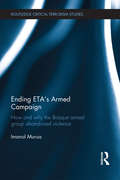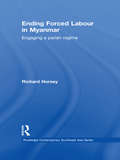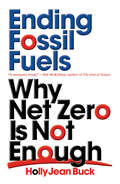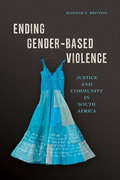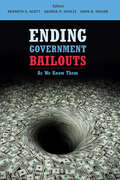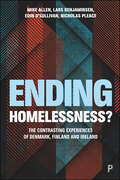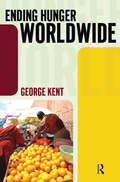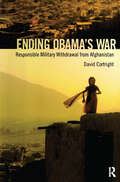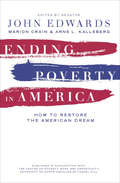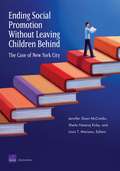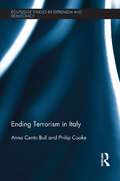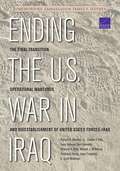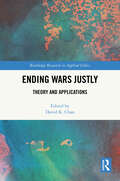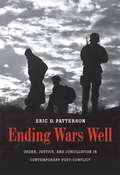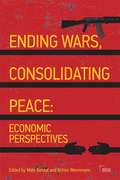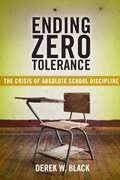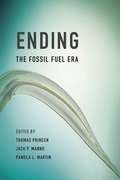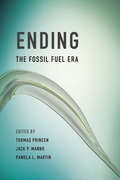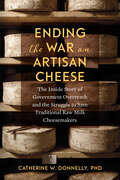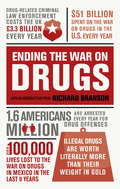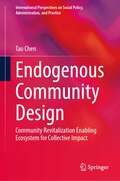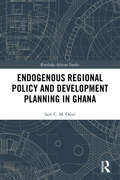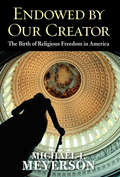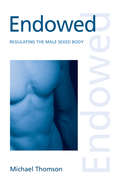- Table View
- List View
Ending ETA's Armed Campaign: How and Why the Basque Armed Group Abandoned Violence (Routledge Critical Terrorism Studies)
by Imanol MuruaThis book explains how and why the Basque separatist armed group ETA decided to end its armed campaign against the Spanish state. The ETA’s armed campaign for Basque independence lasted fifty years and led to more than 800 casualties. This book analyzes the factors that led to ETA ending its campaign of violence in 2011, despite having yet to achieve its political objectives. It explains how the Basque pro-independence movement’s political leadership won an internal battle and brought ETA to a position in which abandoning violence was the only feasible choice. The work argues that the key factor leading to the cessation of violence was the loss of support for armed struggle within the pro-independence social base, and it examines why and how that support decreased so decisively. Written by a former journalist, the narrative is based on more than 30 interviews, including former members of ETA, Spanish judges, former ministers of the Spanish government, political leaders of all Basque political parties—from the Nationalist Left to the Partido Popular (PP)—and international mediators. As such, it is the first book to recount in detail the inside story of the internal struggle within the Nationalist Left movement, and particularly between the political party Batasuna and ETA. This book will be of much interest to students of political violence, ethnic conflict, nationalism, Spanish politics, security studies, and IR.
Ending Forced Labour in Myanmar: Engaging a Pariah Regime (Routledge Contemporary Southeast Asia Series)
by Richard HorseyThe International Labour Organization’s (ILO) efforts since the early 1990s to address the forced labour situation in Myanmar represent a rare example of success in influencing the behaviour of that regime, and this book gives a first-hand account of these efforts. As the ILO’s representative in the country, the author was able to operate a complaint system for victims of forced labour, resulting in prosecutions of government officials and an end to many abuses. In addition to giving a fascinating insider’s account of how this was achieved, and the many challenges encountered, the book examines in detail why one of the most repressive military regimes allowed the ILO to operate a complaints mechanism in the first place, and why it felt the need to take action in response to some of those complaints. This book will make a significant contribution to thinking on how to influence authoritarian regimes, as well as understanding the dynamic of relations with Myanmar. As such it is an essential read for scholars of international relations and global governance, human rights, international law and Southeast Asian studies.
Ending Fossil Fuels: Why Net Zero is Not Enough
by Holly Jean BuckEnding the fossil fuel industry is the only credible path for climate policyAround the world, countries and companies are setting net-zero carbon emissions targets. But what will it mean if those targets are achieved? One possibility is that fossil fuel companies will continue to produce billions of tons of atmospheric CO2 while relying on a symbiotic industry to scrub the air clean. Focusing on emissions draws our attention away from the real problem: the point of production.The fossil fuel industry must come to an end but will not depart willingly; governments must intervene. By embracing a politics of rural-urban coalitions and platform governance, climate advocates can build the political power needed to nationalize the fossil fuel industry and use its resources to draw carbon out of the atmosphere.
Ending Gender-Based Violence: Justice and Community in South Africa
by Hannah E. BrittonSouth African women's still-increasing presence in local, provincial, and national institutions has inspired sweeping legislation aimed at advancing women's rights and opportunity. Yet the country remains plagued by sexual assault, rape, and intimate partner violence. Hannah E. Britton examines the reasons gendered violence persists in relationship to social inequalities even after women assume political power. Venturing into South African communities, Britton invites service providers, religious and traditional leaders, police officers, and medical professionals to address gender-based violence in their own words. Britton finds the recent turn toward carceral solutions—with a focus on arrests and prosecutions—fails to address the complexities of the problem and looks at how changing specific community dynamics can defuse interpersonal violence. She also examines how place and space affect the implementation of policy and suggests practical ways policymakers can support street level workers. Clear-eyed and revealing, Ending Gender-Based Violence offers needed tools for breaking cycles of brutality and inequality around the world.
Ending Government Bailouts as We Know Them
by George P. Shultz Kenneth E. ScottThis book examines the dangers of continuing government bailouts and offers alternative strategies designed to produce growth based on the vigor of the private sector with inflation under control. The expert authors show that it is indeed possible to explain the causes of the crisis in understandable terms and clarify why resolving the bailout problem is essential to preventing future crises.
Ending Homelessness?: The Contrasting Experiences of Ireland, Denmark and Finland
by Michael Allen Lars BenjaminsenHomelessness is on the increase in most European states and remains at stubbornly high levels across developed nations. This is despite increased policy attention, economic provision and the implementation of strategies that have promised to stop homelessness in its tracks, rather than simply manage the crisis. Providing an in-depth exploration of the experiences of Ireland, Denmark and Finland in their various initiatives designed to end homelessness, this book presents an authoritative comparative account of policies and strategies that have worked, along with an exposition of those that have not. Making an invaluable and timely contribution to the current debate, it provides essential policy lessons for the multiple jurisdictions seeking to successfully bring homelessness to an end.
Ending Hunger Worldwide
by George KentWhy does hunger persist in a world of plenty? Ending Hunger Worldwide challenges the naive notion that everyone wants hunger to end, arguing that the powerful care - but not enough to make a difference. George Kent argues that the central focus in overcoming hunger should be on building stronger communities. It is these communities which can provide mutual support to ensure that people don't go hungry. Kent demonstrates that there is not a shortage of food but of what Amartya Sen terms 'opportunities', and that developing tight-knit communities will lead to more opportunities for the hungry and undernourished. Ending Hunger Worldwide challenges dominant market-led solutions, and will be essential reading for activists, NGO workers and development students looking for a fresh perspective.
Ending Obama's War: Responsible Military Withdrawal from Afghanistan
by David CortrightNow in its tenth year, the US-led military campaign in Afghanistan continues with no foreseeable end in sight. Ending Obama's War is intended to help and hold President Obama to his policy of beginning military withdrawals in July 2011 - and sooner if possible. Renowned peace scholar David Cortright offers realistic alternatives for ending the war whilst continuing to help the Afghan people, especially women, with development and human rights. Ending Obama's War outlines a responsible military disengagement strategy and links it to agreements on security cooperation, political power sharing, and a regional diplomatic compact. This is a timely, informed study which offers a way forward for one of the world's worst conflict zones.
Ending Poverty in America: How to Restore the American Dream
by David K. Shipler Thomas M. Shapiro Jared Bernstein Katherine S. Newman Elizabeth Warren Richard B. Freeman Jacob S. Hacker William Julius Wilson Michael Ferber Michael S. Barr John Karl Scholz Hugh B. Price Beth Shulman Harry J. Holzer Michael Sherraden Ronald B. Mincy Anita Brown-Graham Carol Mendez Cassell Martin Eakes Jack F. Kemp Sara McLanahan Melvin L. Oliver Peter Orszag Dennis K. Orthner Hillard Pouncy Ruston Seaman David Spickard Michael A. StegmanAn &“engrossing collection of rigorously researched articles&” from Elizabeth Warren, Jared Bernstein, William Julius Wilson, and more (Publishers Weekly). Can the wealthiest nation in the world do anything to combat the steadily rising numbers of Americans living in poverty—or the tens of millions of Americans living in &“near poverty&”? In this book, some of the country&’s most prominent scholars, businesspeople, and community activists answer with a resounding yes. Published in conjunction with one of the country&’s leading anti-poverty centers, Ending Poverty in America brings together respected social scientists, journalists, neighborhood organizers, and business leaders—both liberal and conservative—to tackle hot-button issues such as job creation, schools, housing, and family-friendly social policy, offering a template for a renewed public debate and a genuine effort to confront this urgent issue that undermines the long-term security of our nation. Contributors include: Jared Bernstein, Anita Brown-Graham, Carol Mendez Cassell, Richard Freeman, Angela Glover-Blackwell, Jacob Hacker, Harry Holzer, Jack F. Kemp, Ronald Mincy, Katherine S. Newman, Melvin L. Oliver, Dennis Orthner, David K. Shipler, Beth Shulman, Michael A. Stegman, Elizabeth Warren, William Julius Wilson.
Ending Social Promotion Without Leaving Children Behind
by Jennifer Sloan Mccombs Sheila Nataraj Kirby Louis T. MarianoThe New York City Department of Education asked RAND to conduct an independent longitudinal evaluation of its 5th-grade promotion policy. The findings of that study, conducted between March 2006 and August 2009, provide a comprehensive view of the policy's implementation and its impact on student outcomes, particularly for students at risk of retention and those who were retained in grade.
Ending Terrorism in Italy (Extremism and Democracy)
by Philip Cooke Anna Cento BullEnding Terrorism in Italy analyses processes of disengagement from terrorism, as well as the connected issues of reconciliation, truth and justice. It examines in a critical and original way how terrorism came to an end in Italy (Part I), and the legacy it has left behind (Part II). The book interrogates a wide array of published memoirs and a considerable number of new face-to-face interviews with both former terrorists and first and second generation victims In the last two decades, and especially in recent years, former extreme-right terrorists in Italy have started to talk about their past involvement in terrorist violence, including, for the first time, acts of violence which have for decades been considered taboo, that is to say, bomb attacks against innocent civilians. These narratives add to the perspectives offered by members of left-wing terrorist groups, such as the Red Brigades and Prima Linea. Surprisingly, these narratives have not been systematically examined, yet they form a unique and extremely rich source of first-hand testimony, providing invaluable insights into processes of youth radicalization and de-radicalization, the social re-integration of ex-terrorists, as well as personal and collective healing. Even less attention has been paid to the victims’ narratives or stories. Indeed, the views and activities of the victims and their associations have been seriously neglected in the scholarly literature on terrorism, not just in Italy, but elsewhere in Europe. The book therefore examines the perspectives of the victims and relatives of victims of terrorism, who over the years have formed dedicated associations and campaigned relentlessly to obtain justice through the courts, with little or no support from the state and, especially in the case of the bombing massacres, with increasing awareness that the state played a role in thwarting the course of justice. Ending Terrorism in Italy will be of interest to historians, social scientists and policy makers as well as students of political violence and post-conflict resolution. .
Ending The U.s. War In Iraq
by Ben Connable Terrence K. Kelly Charles P. Ries Richard R. Brennan Larry HanauerEnding the U. S. war in Iraq required redeploying 100,000 military and civilian personnel; handing off responsibility for 431 activities to the Iraqi government, U. S. embassy, USCENTCOM, or other U. S. government entities; and moving or transferring ownership of over a million pieces of property in accordance with U. S. and Iraqi laws, national policy, and DoD requirements. This book examines the planning and execution of this transition.
Ending Wars Justly: Theory and Applications (Routledge Research in Applied Ethics)
by David K. ChanThis volume features original essays on the ethics of ending wars (jus ex bello). It fills a significant gap in just war theory and sets the stage for other thinkers to engage with the topic.What makes questions about jus ex bello especially difficult for ethicists to answer is that the just war tradition has neglected to develop principles for ending wars justly. Until recently, debates have primarily focused on justice in going to war (jus ad bellum), justice in fighting a war (jus in bello), and justice after war (jus post bellum). Additionally, many contemporary conflicts are unconventional and not the kind that the traditional principles of just war theory are designed to address. The chapters in this volume address the question of how and when wars can end justly. Part 1 approaches jus ex bello from different theoretical angles, including just war theory, virtue ethics, pacifism, and feminism. Part 2 discusses specific aspects of recent wars: the United States' withdrawal from Afghanistan after 20 years of military involvement in the country, and the war that began with the Russian invasion of Ukraine in 2022, that is so difficult to end despite the escalating human cost.Ending Wars Justly is an essential resource for scholars and advanced students working in just war theory, the ethics of war and peace, international relations, and military and strategic studies.
Ending Wars Well
by Eric D. PattersonThough scholars of political science and moral philosophy have long analyzed the justifications for and against waging war as well as the ethics of warfare itself, the problem ofendingwars has received less attention. In the first book to apply just war theory to this phase of conflict, Eric Patterson presents a three-part view of justice in end-of-war settings involving order, justice, and reconciliation. Patterson’s case studies range from successful applications ofjus post bellum,such as the U. S. Civil War or Kosovo, to challenges such as present-day Iraq.
Ending Wars, Consolidating Peace: Economic Perspectives (Adelphi series)
by Mats Berdal Achim WennmannThe transition from war to peace is fraught with tension and the risk of a return to bloodshed. With so much at stake, it is crucial that the international community and local stakeholders make sense of the complex mosaic of challenges, to support a lasting, inclusive and prosperous peace. Recent missions, such as in Afghanistan, Somalia, or Sudan, have highlighted the fact that there can be no one-size-fits-all approach to steering countries away from violence and towards stability. This Adelphi offers a series of economic perspectives on conflict resolution, to show how the challenges of peacebuilding can be more effectively tackled. From the need to marry diplomatic peacemaking with development efforts, and activate the private sector in the service of peacebuilding aims, to the use of taxes and natural resource revenues as a financial base for sustainable peace, this book considers how economic factors can positively shape and drive peace processes. It takes an unflinching look at the complex ways in which power and order may be manifested in conflict zones, where unpalatable compromises with local warlords can often be the first step towards a more lasting settlement. A difficult balance must be struck by peacemakers and peacebuilders in assisting countries and communities in their transitions out of war, for the consequences of failure for countries and the wider world are too grave. In distilling expertise from a range of disciplines, this Adelphi seeks to inform a more economically integrated and responsive approach to helping countries leave behind their troubled pasts and take a fuller role in constructing their futures.
Ending Zero Tolerance: The Crisis of Absolute School Discipline (Families, Law, and Society #12)
by Derek W BlackAnswers the calls of grassroots communities pressing for integration and increased education funding with a complete rethinking of school disciplineIn the era of zero tolerance, we are flooded with stories about schools issuing draconian punishments for relatively innocent behavior. One student was suspended for chewing a Pop-Tart into the shape of a gun. Another was expelled for cursing on social media from home. Suspension and expulsion rates have doubled over the past three decades as zero tolerance policies have become the normal response to a host of minor infractions that extend well beyond just drugs and weapons. Students from all demographic groups have suffered, but minority and special needs students have suffered the most. On average, middle and high schools suspend one out of four African American students at least once a year. The effects of these policies are devastating. Just one suspension in the ninth grade doubles the likelihood that a student will drop out. Fifty percent of students who drop out are subsequently unemployed. Eighty percent of prisoners are high school drop outs. The risks associated with suspension and expulsion are so high that, as a practical matter, they amount to educational death penalties, not behavioral correction tools. Most important, punitive discipline policies undermine the quality of education that innocent bystanders receive as well—the exact opposite of what schools intend. Derek Black, a former attorney with the Lawyers’ Committee for Civil Rights Under Law, weaves stories about individual students, lessons from social science, and the outcomes of courts cases to unearth a shockingly irrational system of punishment. While schools and legislatures have proven unable and unwilling to amend their failing policies, Ending Zero Tolerance argues for constitutional protections to check abuses in school discipline and lays out theories by which courts should re-engage to enforce students’ rights and support broader reforms.
Ending the Fossil Fuel Era
by Thomas Princen Pamela L. Martin Jack P. MannoNot so long ago, people North and South had little reason to believe that wealth from oil, gas, and coal brought anything but great prosperity. But the presumption of net benefits from fossil fuels is eroding as widening circles of people rich and poor experience the downside.A positive transition to a post-fossil fuel era cannot wait for global agreement, a swap-in of renewables, a miracle technology, a carbon market, or lifestyle change. This book shows that it is now possible to take the first step toward the post-fossil fuel era, by resisting the slow violence of extreme extraction and combustion, exiting the industry, and imagining a good life after fossil fuels. It shows how an environmental politics of transition might occur, arguing for going to the source rather than managing byproducts, for delegitimizing fossil fuels rather than accommodating them, for engaging a politics of deliberately choosing a post-fossil fuel world. Six case studies reveal how individuals, groups, communities, and an entire country have taken first steps out of the fossil fuel era, with experiments that range from leaving oil under the Amazon to ending mountaintop removal in Appalachia.
Ending the Fossil Fuel Era
by Thomas Princen Pamela L. Martin Jack P. MannoNot so long ago, people North and South had little reason to believe that wealth from oil, gas, and coal brought anything but great prosperity. But the presumption of net benefits from fossil fuels is eroding as widening circles of people rich and poor experience the downside.A positive transition to a post-fossil fuel era cannot wait for global agreement, a swap-in of renewables, a miracle technology, a carbon market, or lifestyle change. This book shows that it is now possible to take the first step toward the post-fossil fuel era, by resisting the slow violence of extreme extraction and combustion, exiting the industry, and imagining a good life after fossil fuels. It shows how an environmental politics of transition might occur, arguing for going to the source rather than managing byproducts, for delegitimizing fossil fuels rather than accommodating them, for engaging a politics of deliberately choosing a post-fossil fuel world. Six case studies reveal how individuals, groups, communities, and an entire country have taken first steps out of the fossil fuel era, with experiments that range from leaving oil under the Amazon to ending mountaintop removal in Appalachia.
Ending the Fossil Fuel Era (The\mit Press Ser.)
by Thomas Princen Pamela L. Martin Jack P. MannoA provocative call for delegitimizing fossil fuels rather than accommodating them, accompanied by case studies from Ecuador to Appalachia and from Germany to Norway.Not so long ago, people North and South had little reason to believe that wealth from oil, gas, and coal brought anything but great prosperity. But the presumption of net benefits from fossil fuels is eroding as widening circles of people rich and poor experience the downside.A positive transition to a post-fossil fuel era cannot wait for global agreement, a swap-in of renewables, a miracle technology, a carbon market, or lifestyle change. This book shows that it is now possible to take the first step toward the post-fossil fuel era, by resisting the slow violence of extreme extraction and combustion, exiting the industry, and imagining a good life after fossil fuels. It shows how an environmental politics of transition might occur, arguing for going to the source rather than managing byproducts, for delegitimizing fossil fuels rather than accommodating them, for engaging a politics of deliberately choosing a post-fossil fuel world. Six case studies reveal how individuals, groups, communities, and an entire country have taken first steps out of the fossil fuel era, with experiments that range from leaving oil under the Amazon to ending mountaintop removal in Appalachia.
Ending the War on Artisan Cheese: The Inside Story of Government Overreach and the Struggle to Save Traditional Raw Milk Cheesemakers
by Catherine DonnellyA prominent food scientist defends the use of raw milk in traditional artisan cheesemaking.Raw milk cheese—cheese made from unpasteurized milk—is an expansive category that includes some of Europe&’s most beloved traditional styles: Parmigiano Reggiano, Gruyère, and Comté, to name a few. In the United States, raw milk cheese forms the backbone of the resurgent artisan cheese industry, as consumers demand local, traditionally produced, and high-quality foods. Internationally award-winning artisan cheeses like Bayley Hazen Blue (Jasper Hill, VT) would have been unimaginable just forty years ago when American cheese meant Kraft Singles.Unfortunately the artisan cheese industry faces an existential regulatory threat. Over the past thirty years the US Food and Drug Administration (FDA) has edged toward an outright ban on raw milk cheeses. Their assault on traditional cheesemaking goes beyond a debate about raw milk safety; the FDA has also attempted to ban the use of wooden boards, the use of ash in cheese ripening, and has set stringent microbiological criteria that many artisan cheeses cannot meet. The David versus Goliath existence of small producers fighting crushing regulations is true in parts of Europe as well, where beloved creameries are going belly-up or being bought out because they can&’t comply with EU health ordinances. Centuries-old cheese styles like Fourme d&’Ambert and Cantal are nearing extinction, leading Prince Charles to decry the &“bacteriological correctness&” of European regulators.The dirty secret is that Listeria and other bacterial outbreaks occur in pasteurized cheeses more often than in raw milk cheeses, and traditional processes like ash-ripening have been proven safe. In Ending the War on Artisan Cheese, Dr. Catherine Donnelly forcefully defends traditional cheesemaking, while exposing government actions in the United States and abroad designed to take away food choice under the false guise of food safety. This book is fundamentally about where and how our food is produced, the values we place on methods of food production, and how the roles of tradition, heritage, and quality often conflict with advertising, politics, and profits in influencing our food choices.
Endogenous Community Design: Community Revitalization Enabling Ecosystem for Collective Impact (International Perspectives on Social Policy, Administration, and Practice)
by Tao ChenThis book is a comprehensive exploration of endogenous community building, aiming to investigate how to create a vibrant, service-integrated, and sustainable community through collective impact approaches. It’s a guide to social innovation that combines theory and practical application. In terms of theory, it constructs concepts such as endogenous community, endogenous design system, life project platform and enabling ecosystem. In practice, it offers design methods and a toolkit for collective impact to enhance community resilience and capacity through service co-creation. This book provides readers with a systematic guide to endogenous community design, ranging from conceptual understanding and theoretical models to practical methodologies. Its aim is to build a sociotechnical system from the bottom-up to address complex issues.This book is ideal for community leaders, government officials, NGOs, urban planners, social innovators, and anyone passionate about sustainable community development.
Endogenous Regional Policy and Development Planning in Ghana (Routledge African Studies)
by Sam C.M. OforiThis book examines regional development and planning in a poor administrative region of Ghana, assessing the effectiveness of the programmes and projects initiated to reduce poverty, disadvantage and deprivation. The author analyses the local context of institutions, planning legislation, broad external (exogenous) and internal (endogenous) influencing factors and forces. He then assesses how they have impacted the effectiveness of regional policy interventions aimed at social and economic development. Using applied planning principles, the book proposes policies to address the challenges of Local Economic Development (LED), urban regeneration and conservation, housing regeneration and regional sustainability in the developing world. This book will be of interest to students, scholars policy-makers and regional planning practitioners in urban and regional development and planning, geography and African Studies.
Endowed By Our Creator
by Michael I. MeyersonThe debate over the framers’ concept of freedom of religion has become heated and divisive. This scrupulously researched book sets aside the half-truths, omissions, and partisan arguments, and instead focuses on the actual writings and actions of Washington, Adams, Jefferson, Madison, and others. Legal scholar Michael I. Meyerson investigates how the framers of the Constitution envisioned religious freedom and how they intended it to operate in the new republic. Endowed by Our Creatorshows that the framers understood that the American government should not acknowledge religion in a way that favors any particular creed or denomination. Nevertheless, the framers believed that religion could instill virtue and help to unify a diverse nation. They created a spiritual public vocabulary, one that could communicate to all—including agnostics and atheists—that they were valued members of the political community. Through their writings and their decisions, the framers affirmed that respect for religious differences is a fundamental American value. Now it is for us, Meyerson concludes, to determine whether religion will be used to alienate and divide or to inspire and unify our religiously diverse nation.
Endowed: Regulating the Male Sexed Body
by Michael ThomsonFeminist legal scholars and health care lawyers have long engaged with law’s responses to the female reproductive body, especially on what the legal regulation of women’s reproductive lives can tell us about the broader relationship between law and gender. Acknowledging this work and building upon it, Endowed considers the interaction of law and ideas of male reproductivity. In particular, it seeks to uncover what these regulatory moments can tell us about contemporary ideas and ideals of masculinity and the male sexed body. Spanning topics such as male circumcision and the regulation of state access to Viagra, the book uncovers recurring motifs that define masculinity and the male body in the legal imagination. In looking to these understandings the book engages with broader questions regarding the relationship between law and gender and between masculinity and social organization.
